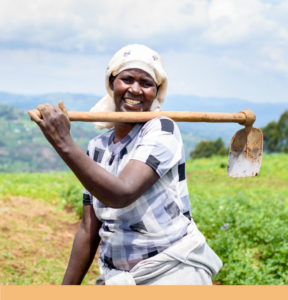RTB Toolbox: Sowing seeds of change for food system transformation
300 million smallholder farmers in developing countries depend on crops like potato, sweetpotato, yam, and cassava which are vulnerable to pests and diseases which destroy harvests and livelihoods. This second story in the CIP@50 series looks inside a new Toolbox for Seed Systems developed as part of the CGIAR Research Program on Roots, Tubers and Bananas (RTB) to see how policymakers, scientists, and practitioners are using its contents to help farmers and crops fight back.
Planting potatoes, not potato wart, in Georgia
Georgians really love potatoes. Commonly known as “second bread,” potatoes form a key part of Georgian diets, culture, and heritage. Yet when it comes to potato production, annual yields fall more than 50% short of potential. One reason for this is poor seed quality. Farmers save seed tubers from one year’s harvest to the next which means that over time they accumulate crop diseases, like potato wart – a fungal disease that can render tubers unfit for consumption and contaminate soil for years to come.
“Seeds are the beating heart of food systems and to perform well it is critical they are healthy,” says Margaret McEwan, a senior project manager for the CGIAR Research Program on Roots, Tubers and Bananas (RTB). “But we need to remember that seeds don’t exist in isolation. They are part of complex seed systems that also need to be healthy if they are to meet the needs of consumers, producers, and markets.”
Lifting the lid on the new Toolbox for Seed Systems
McEwan is one of the scientists who contributed to the new Toolbox for Seed Systems developed by RTB. It contains 11 tried and tested tools and strategies for researchers, practitioners, and policymakers to use to better understand, support, and strengthen seed systems for diverse crops around the world. It allows its users to see across the whole seed system, picking and mixing the tools they need and adapting them to fit a whole range of scenarios.
“What is exciting about the Toolbox is that it is more than the sum of its parts,” says Conny Almekinders, an associate professor at Wageningen University in the Netherlands. “Putting it together was a truly collaborative effort of many scientists and partners. Many seed system interventions have failed in the past, particularly for vegetative crops like potatoes and yam, and it was important to be honest about those failings and learn from them.”
So far, the Toolbox is proving its worth. In Georgia, scientists from CIP, working with the Ministry of Environment and Agriculture and local partners, have used the integrated seed health approach tool as part of a national strategy to create a more effective, efficient, and sustainable potato seed system. Hundreds of farmers now use a simple visual technique to choose the best seed tubers and potato yields are expected to rise dramatically. The impact network analysis tool also helped the team to model scenarios for the likely spread of potato wart, meaning potential hotspots could be identified and closely monitored.
“Tracking the spread of diseases is particularly difficult in informal seed systems,” explains Jorge Andrade-Piedra, seed expert and plant pathologist at the International Potato Center (CIP). “Most seed materials that farmers use in developing countries are harvested from their own farms, exchanged with neighbors, or bought at the local market. We just don’t know enough about how different seeds are disseminated or where they go. The tools are critical to map seed systems to stop a disease before farmers lose their entire harvest.”
Empowering sweetpotato farmers to fight back in Tanzania
With smallholders responsible for half of the world’s food supply, enhancing their resilience builds global capacity to bounce back from climate and economic shocks. The National Agricultural Research System in Tanzania working with CIP and local NGOs ensured that farmers were firmly planted in the center of their national strategy to improve their sweetpotato seed system.
Using the Toolbox’s integrated seed health approach, researchers discovered that farmers did not understand how often they needed to replace planting materials. Seed health models assessed the degeneration of two sweetpotato varieties resulting in new guidelines that were shared with farmers to avoid this problem in the future.
To fix the food system, fix the seed system
The UN declared 2021 as the International Year of Plant Health to place attention on the importance of plant health to end hunger, reduce poverty, protect the environment, and boost economic development. The evidence is there. Through seed system interventions introduced by CIP, RTB and their partners, more than two million small-scale farmers in Africa and Asia have increased yields and incomes from potato alone. With its potential for use across a wide range of seed systems, the Toolbox is set to become a valuable asset within the One CGIAR portfolio of game-changing solutions to transform food systems.
*The Toolbox for Seed Systems is part of the CGIAR Research Program on Roots, Tubers, and Bananas (RTB). It is regarded as one of the ‘Golden Egg’ collective assets that will drive forward One CGIAR’s mission to transform food, land, and water systems in a climate crisis. RTB is a partnership collaboration of five research centers, led by the International Potato Center, with decades of experience in these crops on different continents, including the Alliance of Bioversity International and CIAT, the International Institute of Tropical Agriculture, the International Potato Center, and the French Agricultural Research Centre for International Development (CIRAD).

